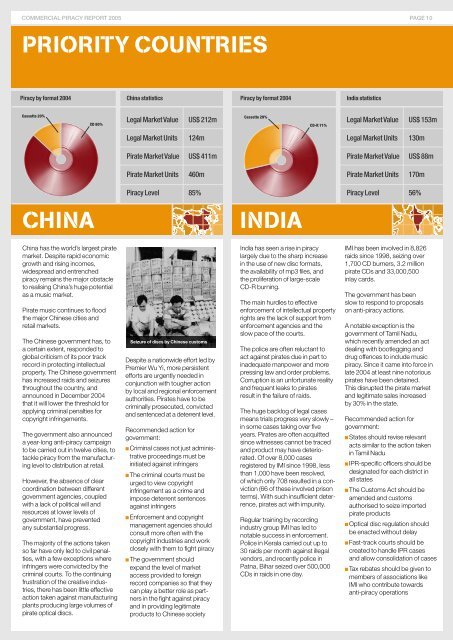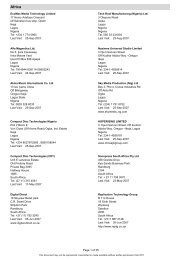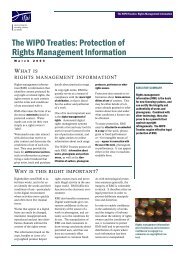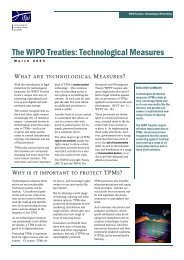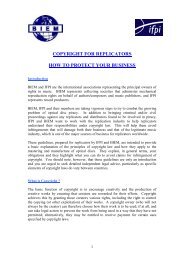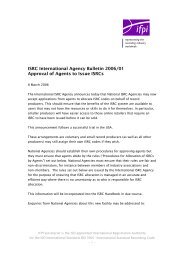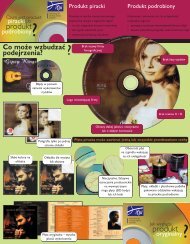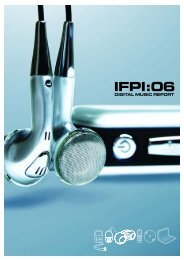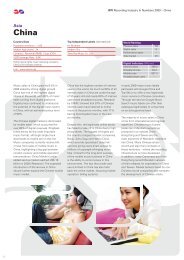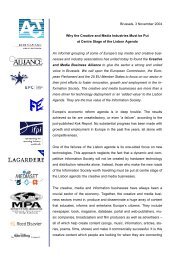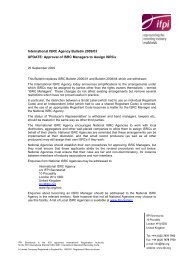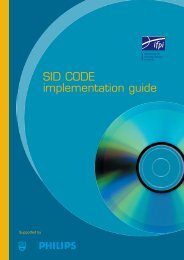*IFIC 20ppv3 - IFPI
*IFIC 20ppv3 - IFPI
*IFIC 20ppv3 - IFPI
Create successful ePaper yourself
Turn your PDF publications into a flip-book with our unique Google optimized e-Paper software.
COMMERCIAL PIRACY REPORT 2005 PAGE 10<br />
PRIORITY COUNTRIES<br />
Piracy by format 2004<br />
China statistics<br />
Piracy by format 2004<br />
India statistics<br />
Cassette 20%<br />
CD 80%<br />
Legal Market Value<br />
US$ 212m<br />
Cassette 29%<br />
CD-R 71%<br />
Legal Market Value<br />
US$ 153m<br />
Legal Market Units<br />
124m<br />
Legal Market Units<br />
130m<br />
Pirate Market Value<br />
US$ 411m<br />
Pirate Market Value<br />
US$ 88m<br />
Pirate Market Units<br />
460m<br />
Pirate Market Units<br />
170m<br />
Piracy Level 85%<br />
Piracy Level 56%<br />
CHINA<br />
INDIA<br />
China has the world’s largest pirate<br />
market. Despite rapid economic<br />
growth and rising incomes,<br />
widespread and entrenched<br />
piracy remains the major obstacle<br />
to realising China’s huge potential<br />
as a music market.<br />
Pirate music continues to flood<br />
the major Chinese cities and<br />
retail markets.<br />
The Chinese government has, to<br />
a certain extent, responded to<br />
global criticism of its poor track<br />
record in protecting intellectual<br />
property. The Chinese government<br />
has increased raids and seizures<br />
throughout the country, and<br />
announced in December 2004<br />
that it will lower the threshold for<br />
applying criminal penalties for<br />
copyright infringements.<br />
The government also announced<br />
a year-long anti-piracy campaign<br />
to be carried out in twelve cities, to<br />
tackle piracy from the manufacturing<br />
level to distribution at retail.<br />
However, the absence of clear<br />
coordination between different<br />
government agencies, coupled<br />
with a lack of political will and<br />
resources at lower levels of<br />
government, have prevented<br />
any substantial progress.<br />
The majority of the actions taken<br />
so far have only led to civil penalties,<br />
with a few exceptions where<br />
infringers were convicted by the<br />
criminal courts. To the continuing<br />
frustration of the creative industries,<br />
there has been little effective<br />
action taken against manufacturing<br />
plants producing large volumes of<br />
pirate optical discs.<br />
Seizure of discs by Chinese customs<br />
Despite a nationwide effort led by<br />
Premier Wu Yi, more persistent<br />
efforts are urgently needed in<br />
conjunction with tougher action<br />
by local and regional enforcement<br />
authorities. Pirates have to be<br />
criminally prosecuted, convicted<br />
and sentenced at a deterrent level.<br />
Recommended action for<br />
government:<br />
■ Criminal cases not just administrative<br />
proceedings must be<br />
initiated against infringers<br />
■ The criminal courts must be<br />
urged to view copyright<br />
infringement as a crime and<br />
impose deterrent sentences<br />
against infringers<br />
■ Enforcement and copyright<br />
management agencies should<br />
consult more often with the<br />
copyright industries and work<br />
closely with them to fight piracy<br />
■ The government should<br />
expand the level of market<br />
access provided to foreign<br />
record companies so that they<br />
can play a better role as partners<br />
in the fight against piracy<br />
and in providing legitimate<br />
products to Chinese society<br />
India has seen a rise in piracy<br />
largely due to the sharp increase<br />
in the use of new disc formats,<br />
the availability of mp3 files, and<br />
the proliferation of large-scale<br />
CD-R burning.<br />
The main hurdles to effective<br />
enforcement of intellectual property<br />
rights are the lack of support from<br />
enforcement agencies and the<br />
slow pace of the courts.<br />
The police are often reluctant to<br />
act against pirates due in part to<br />
inadequate manpower and more<br />
pressing law and order problems.<br />
Corruption is an unfortunate reality<br />
and frequent leaks to pirates<br />
result in the failure of raids.<br />
The huge backlog of legal cases<br />
means trials progress very slowly –<br />
in some cases taking over five<br />
years. Pirates are often acquitted<br />
since witnesses cannot be traced<br />
and product may have deteriorated.<br />
Of over 8,000 cases<br />
registered by IMI since 1998, less<br />
than 1,000 have been resolved,<br />
of which only 708 resulted in a conviction<br />
(66 of these involved prison<br />
terms). With such insufficient deterrence,<br />
pirates act with impunity.<br />
Regular training by recording<br />
industry group IMI has led to<br />
notable success in enforcement.<br />
Police in Kerala carried out up to<br />
30 raids per month against illegal<br />
vendors, and recently police in<br />
Patna, Bihar seized over 500,000<br />
CDs in raids in one day.<br />
IMI has been involved in 8,826<br />
raids since 1998, seizing over<br />
1,700 CD burners, 3.2 million<br />
pirate CDs and 33,000,500<br />
inlay cards.<br />
The government has been<br />
slow to respond to proposals<br />
on anti-piracy actions.<br />
A notable exception is the<br />
government of Tamil Nadu,<br />
which recently amended an act<br />
dealing with bootlegging and<br />
drug offences to include music<br />
piracy. Since it came into force in<br />
late 2004 at least nine notorious<br />
pirates have been detained.<br />
This disrupted the pirate market<br />
and legitimate sales increased<br />
by 30% in the state.<br />
Recommended action for<br />
government:<br />
■ States should revise relevant<br />
acts similar to the action taken<br />
in Tamil Nadu<br />
■ IPR-specific officers should be<br />
designated for each district in<br />
all states<br />
■ The Customs Act should be<br />
amended and customs<br />
authorised to seize imported<br />
pirate products<br />
■ Optical disc regulation should<br />
be enacted without delay<br />
■ Fast-track courts should be<br />
created to handle IPR cases<br />
and allow consolidation of cases<br />
■ Tax rebates should be given to<br />
members of associations like<br />
IMI who contribute towards<br />
anti-piracy operations


